
Music is intended and designed for sentient beings that have
Music is intended and designed for sentient beings that have hopes and purposes and emotions.






The words of Jacques Barzun, “Music is intended and designed for sentient beings that have hopes and purposes and emotions,” carry the weight of eternal truth. They remind us that music is not a thing of accident nor a mere pattern of sounds. It is a creation forged for hearts that can dream, for minds that can strive, for spirits that can feel. The stones of the earth do not need melody, nor do the winds themselves demand harmony. But humankind—creatures of longing, of sorrow, of joy—cannot live without it. Music belongs to us because we are beings who hunger for meaning.
Barzun, the great cultural historian, saw in the arts not idle ornament, but vessels of civilization’s soul. His words remind us that music is not machinery, not calculation, not lifeless design. It is woven for those who can weep and laugh, for those who can rise in triumph or fall into despair. To be sentient is to know more than survival; it is to carry within the breast a spark of the infinite. And music is the fire that answers that spark.
History itself bears witness to this truth. When the slaves of America sang their spirituals, they were not composing for elegance or amusement. They sang because their hopes demanded voice, their emotions could not be contained in silence. Songs like “Go Down, Moses” carried not only lament but purpose—the longing for freedom, the strength to endure, the courage to dream of deliverance. Their music was born of suffering, yet it rose like a pillar of light, guiding them through the darkness. Truly, music exists for sentient beings who can transform agony into song.
The ancients too knew this power. The Greeks sang hymns to their gods, blending purpose and emotion into one sacred offering. In battle, soldiers marched to flutes and drums, for rhythm bound their courage and united their hearts. In temples and in homes, mothers sang to their children so that love would be carried not only in words but in melody. Across all cultures, across all ages, music has been the faithful companion of humanity’s inner life—echoing our dreams, sanctifying our struggles, magnifying our joys.
What Barzun unveils is both profound and humbling: that music belongs to the human soul because the human soul itself is music. Each heartbeat is a rhythm, each sigh a note, each hope a silent hymn waiting to be sung. Without emotion, music is hollow; without purpose, it is noise; without hope, it is silence. But when these three dwell in us, music springs forth naturally, as inevitable as breath.
The lesson for us is this: do not treat music as mere background, nor dismiss it as trivial entertainment. Recognize it as a gift shaped for our deepest selves. When you are weary, let it lift you. When you are broken, let it heal you. When you rejoice, let it magnify your joy. And when you doubt, let it remind you that you are alive—that you are a being of thought, of will, of feeling, capable of greatness.
Practically, fill your days with music that nourishes rather than drains. Choose songs that align with your hopes, strengthen your purposes, and honor your emotions. Sing even if no one listens, for the voice that trembles is still a worthy instrument. Learn to play if you can, for the act of shaping sound is also the act of shaping soul. And when you gather with others, let music be a bridge, a bond, a force that unites your hearts in ways words alone never can.
Thus, remember the wisdom of Jacques Barzun: “Music is intended and designed for sentient beings that have hopes and purposes and emotions.” Take this truth into your life. Guard it, cherish it, and live by it. For when we honor music, we honor our very humanity—and when we live with music in our hearts, we live fully, as beings of hope, of purpose, and of love.






AAdministratorAdministrator
Welcome, honored guests. Please leave a comment, we will respond soon